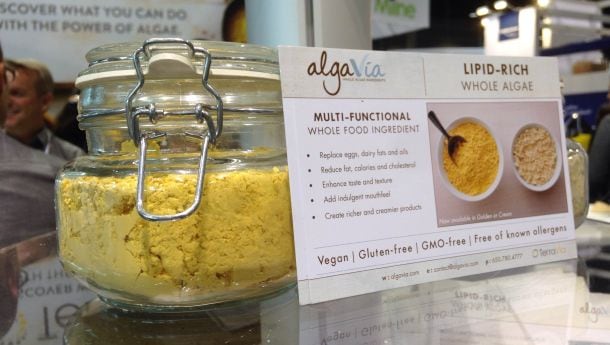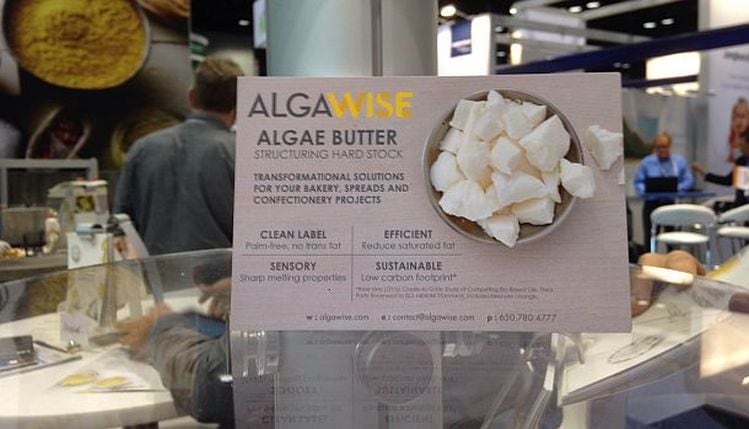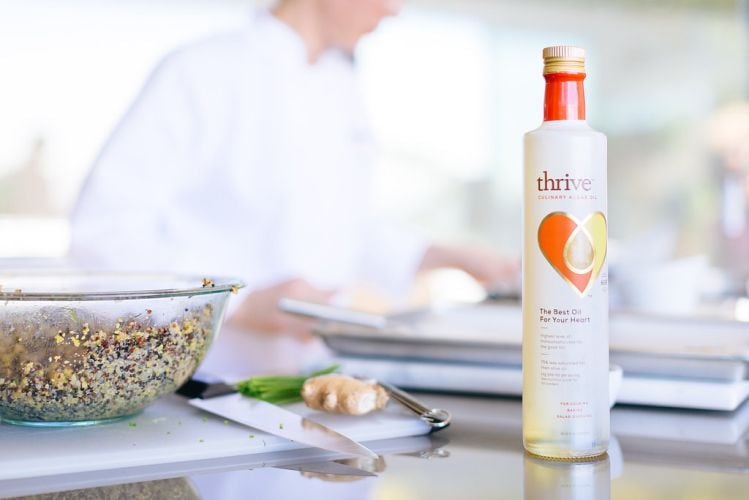The first culinary algae oil on the market, Thrive has 75% less saturated fat than olive oil, unprecedented levels of monounsaturated fat, and zero trans fat. It also has a clean taste and an unusually high smoke point, making it suitable for every type of cooking, including sautéing, frying, baking, dressings and more, says Corbion, a Dutch ingredients giant which acquired San Francisco-based TerraVia via an auction last September.
Most cooking oils come from crops that are planted on vast tracts of agricultural land (and in the case of palm oil, sometimes in places that might be better left alone, like rainforests), fed and watered, and then harvested months later.
By contrast, Thrive algae oil is produced from algae grown in fermentation tanks and is ready to harvest in days, meaning it can effectively be made to order – a completely novel concept in the edible oils market.
Marc den Hartog, executive committee member in charge of innovation platforms at Corbion, told FoodNavigator-USA that 20+ retailers already carry Thrive including Amazon, Safeway/Albertsons, Giant, Publix and Target, with an expansion into the foodservice channel planned for 2019.
“When we looked at the [TerraVia] business we wondered if Thrive would fit for us as we’re an ingredient business to business company, but it’s actually a great tool to educate consumers, nutritionists and policy makers and helps us get good insights from consumers as to why they buy certain products. Is it better for me, for my family, for the planet? But it’s also just a great product, I cook with it myself.
He added: “Thrive is really booming. Retailers see this is a premium product that can sit alongside avocado oils and premium olive oils and upgrade the whole category. Chefs also love it, and for next year we’re looking to extend it into the b2b environment. We’ve had great feedback from foodservice outlets that say they can double the fry life.”

San Francisco-based TerraVia had originally hoped to make a splash in the alternative energy and industrial lubricants market, but made the strategic decision to focus exclusively on food, feed and personal care, rather than biofuel/industrial products, in 2016.
While it reduced its headcount and raised $20m in 2016 by selling a majority stake in its Algenist skincare brand to private equity firm Tengram Capital Partners, TerraVia ran out of cash last summer and filed for bankruptcy protection under Chapter 11 on August 2.
TerraVia selected a $20m stalking horse bid from Dutch ingredients supplier Corbion in an auction for the bulk of its assets, in September 2017.
Products in TerraVia’s portfolio include: AlgaPrime DHA, a long chain omega-3 fatty acid targeting the animal feed market; AlgaPür, a specialty oil targeting personal care markets; culinary algae oil Thrive (a retail product): AlgaVia lipid-rich and protein-rich whole algae powders: AlgaWise high oleic algal oils: and AlgaWise algae butter (a cocoa and shea butter replacement).
It has a new lab facility in San Francisco with a pilot plant, a demonstration plant in Peoria, Illinois where it produces AlgaVia products, and an industrial scale plant in Brazil (producing feed ingredient AlgaPrime DHA, targeting the aquaculture industry).
Algae protein: 'We see opportunities to bring down the cost of almost every product...'
The AlgaVia protein-rich whole algae ingredient also acquired as part of TerraVia’s portfolio contains around 63% protein, along with fiber, lipids and micronutrients such as lutein and zeaxanthin, said den Hartog. Unlike pea protein, AlgaVia protein has a neutral taste, and does not interact with other ingredients in a formulations as the cell wall of the algae remains intact, meaning that it remains stable in a variety of temperatures and pH conditions, and it does not add viscosity or grittiness.
Other key points of difference in the burgeoning 'alternative protein' market are that it is vegan, non-allergenic, non-GMO, and arguably ‘greener’ than rival sources of protein in that it can effectively be made to order – in a matter of days – does not require the cultivation of large tracts of agricultural land, and is highly scalable.
However, it has taken a while to gain traction with larger manufacturers, although it is being used in protein beverages, ready meals, and bakery products from smaller players, said den Hartog.
So what’s holding the market back?
“Two things,” he said. “Definitely price. But we can do something about that. If I look at where the product was when we acquired TerraVia, it was still in its infancy and with our background in industrial production and fermentation we see opportunities to bring down the cost of almost every product. We can bring costs down so it is an affordable protein, not a niche protein.
“The other is that if you look at very large food manufacturers they generally have two year timelines for new launches, so it just takes time to get adopted, while smaller players can move faster. To get it on the shelf in the large billion dollar brands it’s a matter of time.”
He added: “If you look at the next generation of AlgaVia protein products you’ll also see products with higher percentages of protein and a different amino acid profile.”

Algae butter: 'There are lots of opportunities in bakery margarines and laminated dough'
So what about algae butter, which could replace hard fats such as palm oil or partially hydrogenated oils in a variety of applications spanning confectionery, bakery and spreads, and mirrors structuring fats such as shea stearin?
“This is very familiar terrain for me,” said den Hartog (who used to work for fats and oils specialist Loders Croklaan, which was recently acquired by Bunge). “It will take time for people to take it into the toolbox and start formulating with it, but there are lots of opportunities in bakery margarines and laminated dough, where it will help reduced saturated fat levels while maintaining the consistency and mouthfeel that people want, and people want to replace hard fats due to social, ethical or environmental reasons.
“Applications like chocolate fats are a longer term play as there are regulatory issues to get algae fat in there as an approved ingredient.”
AlgaVia lipid-rich whole algae powder
AlgaVia lipid-rich whole algae powder – which can be used as an egg or fat replacer and also contains fiber and other healthy ingredients – has proved “harder to explain to customers what it is and what it does,” but still has potential, claimed den Hartog.
“We will get it back in the market in early 2019, and we’re very much focused on North American bakery where egg replacement and clean label are important trends.”

'The strength of the organization was in the algae platform and the tech behind it, but not in large scale manufacturing'
But what is the bigger picture with algae in food? TerraVia has been telling reporters (and investors) that algae is the next big thing in food for years. But if it has so much potential, why does it still seem like an ‘emerging’ field?
Lots of reasons, said den Hartog, who pointed out that Corbion would not have acquired the TerraVia business if it didn’t fundamentally believe in the long-term potential of algae as a food ingredient.
“When we acquired the assets it was clear that the strength of the organization was in the algae platform and the tech behind it, but not in large scale manufacturing, doing that reliably and consistently in an economically viable way. We’ve set very clear priorities and we’ve already made some meaningful progress in terms of the efficiency of the process.
“When you send people that have been working for decades on lactic acid fermentation into a large fermentation plant using sugar to grow microalgae, within a few hours they are speaking the same language and identifying things that before they thought would be different but turn out to be very similar.
“We’ve had an active exchange of Corbion experts from different locations and placed them in some of the main [TerraVia] locations in the US. We’re also producing algae in our research lab in the Netherlands to leverage the modelling expertise that we can apply to large scale fermentation down in Brazil.”
So what can Corbion bring to the party?
“There are significant improvements in the stability of the process which saves a lot of money and improves clean batches and yields, but also more efficient use of energy, drying, things like that, plus the nutrient dosing of the fermentation, and that’s helping to build a more consistent and cheaper process,” said den Hartog.
“We’re not a niche player, we’re all about large scale food ingredient solutions.”

'We retained a lot of good people...'
As for morale, which likely was not sky high when Corbion acquired TerraVia a year ago, he said: “The good thing is that we retained a lot of good people, but of course the company had gone through tremendous turmoil and a lot of uncertainty, so we weren’t able to retain or bring back all the people that we wanted to.
“Now that sales are developing we’ve been bringing in new people with other talents, but the majority of the teams in San Francisco and Peoria are still the same. The Corbion sales force is also now able to add the algae products to their [portfolio of] products to sell.
"Also we have a large new office in Kansas with great applications and tech support facilities and we’re well advanced in bakery, meat and other sectors, so that’s helpful, but we’ve had to educate our sales force instead of trying to spray [algae ingredient] samples throughout the market, and that more targeted approach has been paying off.”

